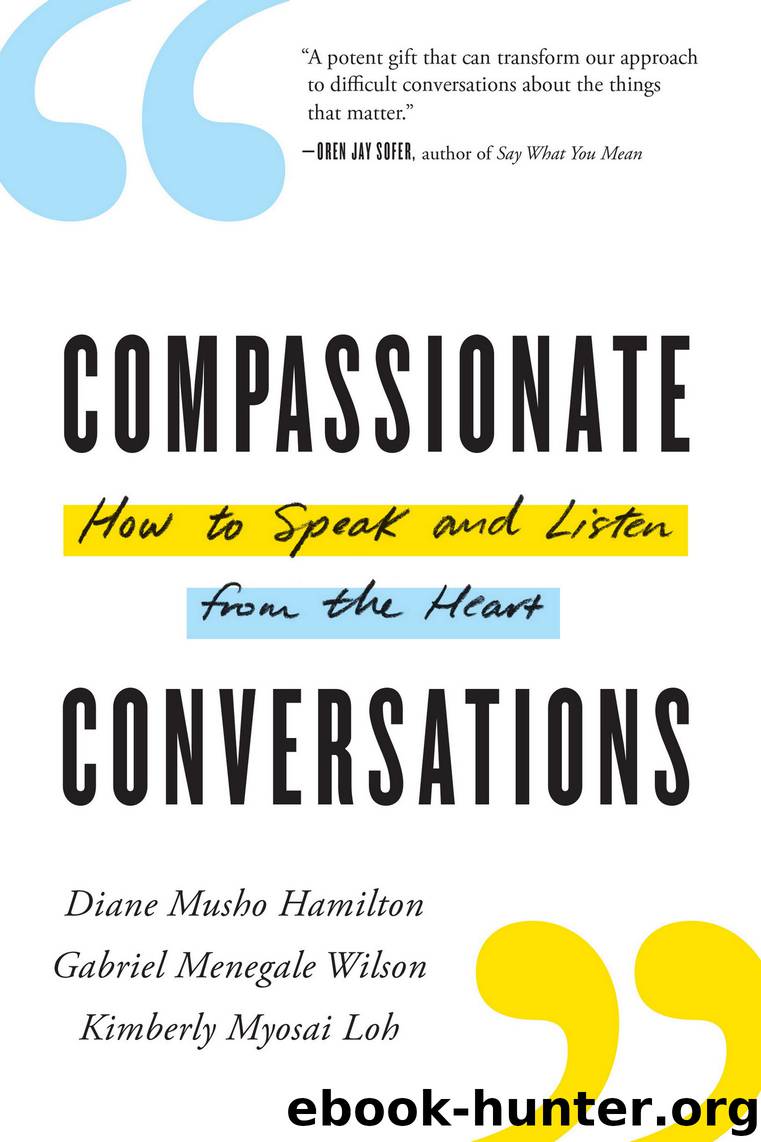Compassionate Conversations by unknow

Author:unknow
Language: eng
Format: epub
Publisher: Shambhala
Published: 2020-05-19T00:00:00+00:00
The Conscious Use of Power
What does it mean to use power consciously? Julie Diamond, another student of Arnold Mindell, has written a very valuable book called Power: A User’s Guide, in which she explores the path of a conscious relationship to power. If we endeavor to do this—and it is a serious undertaking—we must first be willing to acknowledge the presence of power dynamics in our relationships. Then we should study them.
The cultivation of self-awareness is key to our efforts because we all experience having power, even in the smallest ways, and we all know what it’s like to have less power, to lose power, or to feel powerless. But many times we fail to notice both sides of our experience, so it is useful to learn to pay attention, noticing the signals of both poles of the one-up/one-down dynamic. We can practice occupying either end of the polarity, becoming flexible and fluid. And by listening and validating all perspectives, we can soften the power differences, exchanging in a free and flexible way, at least during conversation.
The conscious use of power always includes sharing it, distributing it, or finding new and different ways to structure it. A leader who is conscious of their power is always aware that someone else may have a better answer, vision, or insight. He or she is highly sensitive to the fact that their power is given to them by their supporters and can be taken away. People who are aware of their power and privilege will make great efforts to ensure they are empowering other voices by listening or giving the spotlight to others so they can speak or act.
Everybody should have the experience of being a dictator for a day, just to learn what it’s like to be given power and then have to use it. We might start out with our head in the clouds like our DJ at Burning Man, but we will be knocked back to earth soon enough when the responsibility that comes with power becomes known. We should be awake to the potential for becoming intoxicated with power but realize how quickly that feel-good experience can lead down a slippery slope. In other words, we need to study the potential pitfalls of having power and the limitations of our own perspective, and invite feedback regularly to illuminate our blind spots. Conscious leaders will solicit feedback frequently instead of waiting for it to come to them.
The truth is, from an evolutionary biology point of view, power is a deep and abiding aspect of the human experience.4 It is part of our growth trajectory to learn how to work with power in our relationships. We can’t get rid of it, we can’t disown it, and we can’t neutralize it. But we can become more conscious of it, finding new ways to distribute our power, to structure it, and when we do utilize hierarchy, we can appreciate our good and steady reason for it. Above all, we can and should clarify our determination to use our power and privilege for the good of the whole.
Download
This site does not store any files on its server. We only index and link to content provided by other sites. Please contact the content providers to delete copyright contents if any and email us, we'll remove relevant links or contents immediately.
Adulting by Kelly Williams Brown(3717)
Figure Drawing for Artists by Steve Huston(2831)
Draw Your Day by Samantha Dion Baker(2735)
Drawing Cutting Edge Anatomy by Christopher Hart(2716)
Drawing Shortcuts: Developing Quick Drawing Skills Using Today's Technology by Leggitt Jim(2553)
Make Comics Like the Pros by Greg Pak(2451)
Draw to Win: A Crash Course on How to Lead, Sell, and Innovate With Your Visual Mind by Dan Roam(2298)
How Proust Can Change Your Life by Alain De Botton(2288)
Day by Elie Wiesel(2267)
How The Mind Works by Steven Pinker(2253)
0041152001443424520 .pdf by Unknown(2251)
Rapid Viz: A New Method for the Rapid Visualization of Ideas by Kurt Hanks & Larry Belliston(2232)
Modern Cartooning by Christopher Hart(2215)
Poses for Artists Volume 2 - Standing Poses: An essential reference for figure drawing and the human form. (Inspiring Art and Artists) by Justin Martin(2166)
Draw-A-Saurus by James Silvani(2127)
Learn Drawing Quickly by Sharon Finmark(2114)
Tattoo Art by Doralba Picerno(2104)
Poses for Artists - Dynamic & Sitting: An essential reference for figure drawing and the human form (Inspiring Art and Artists Book 1) by Justin R Martin(2077)
Drawing and Painting Birds by Tim Wootton(2024)
